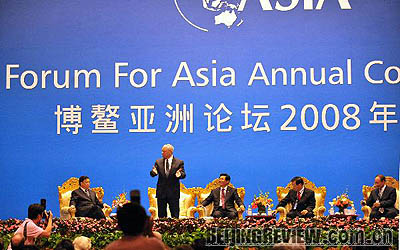|

This year's Boao Forum for Asia (BFA) was different.
The annual BFA conference is supposed to be an economic forum where leaders and business people from across Asia brainstorm on a variety of development issues concerning their continent. But this year, the participants at the BFA, held April 11-13 on the island of Boao in south China's Hainan Province, focused specifically on climate change and resource conservation.
The attendees exchanged views and insights on how to maintain sustainable business development while protecting the Earth. The change in BFA's theme showed Asia's determination to join in the efforts to achieve a "green world."
In an interview with Beijing Review, Zhang Yue, Chief Executive Officer of Broad Air Conditioning Co. Ltd., said the most urgent task in saving energy was changing people's habits. Zhang, known for his consistent efforts to promote environmental protection awareness, also serves as Vice Chairman of the UN Environment Program.
"A lot of people are aware of the significance of saving energy and resources," Zhang said. "But many of their deep-rooted habits prevent them from innovative-thinking in this regard."
For instance, Zhang pointed out that Chinese residents are accustomed to using electricity to power air conditioners. But more than 70 percent of his company's air conditioners that are exported to foreign markets are cooled by waste heat, he said. Waste heat is produced by waste petroleum and natural gas, byproducts of electricity production.
Zhang heavily promotes the use of primary energy. Currently, power stations use coal, oil and natural gas to produce electricity. But when the electricity finally enters homes and businesses, more than 80 percent is wasted during various production processes, he said. Because of this, gas-powered air conditioners will become mainstream in the future, Zhang said.
As a more radical way to promote a green nation, Zhang believes the government should impose tax on carbon, a major element in coal, gas, and oil.
"Only when people feel the pinch of such measures, can their behavior be totally changed," he said.
Kong Xiangdong, a well-known pianist in China, had his own ideas about how Asians can conserve energy. Boao is in a tropical area that has an average temperature of around 30 degrees centigrade, the forum's leaders and panelists are required to wear suits for most occasions. Kong said BFA is a non-governmental organization, and people should dress according to the weather instead of always wearing suits.
"Energy conservation is everywhere, but most of the time we cannot see it," Kong said during a roundtable discussion in Boao.
Starting from small
BFA participants in general agreed that individuals should change their old energy-wasting habits, and companies of all sizes should take immediate actions to stop pollution.
The Chinese Government, for example, has set up posters on city streets to promote water conservation and urge residents to drive their cars less often. The government also has strict environmental protection regulations for companies that are trying to enter potentially polluting industrial sectors.
"Small enterprises must bear the biggest responsibility in protecting the environment," said Xu Ming, Chairman of Dalian Shide Group Co. Ltd., a large privately owned petrochemical conglomerate.
Xu cited his experiences when visiting some of the world's top 10 petrochemical production bases, saying he was impressed by the environmental protection awareness of those companies. The Chinese Government has strict environmentally friendly requirements for potential polluters, but at the grassroots level, more attentions should be paid to the implementation of related regulations, Xu said at the conference in Boao.
The forum participants reached a consensus that Asia's unprecedented economic growth is unsustainable in the long term, unless the continent takes steps to increase energy security and energy efficiency. Nations and businesses provide viable alternative energy sources and reduce environmental damage more broadly across the region. A lot must be done, before Asia as a region can reach the same stage as the United States and European nations in terms of environmental awareness, the BFA participants said.
Many participants also said the media should play an important part in helping to educate the Asian peoples about energy conservation and promote a "green Asia."
"People need constant education on energy conservation," Zhang said. "It is the media that can serve the best as a reminder."
| 